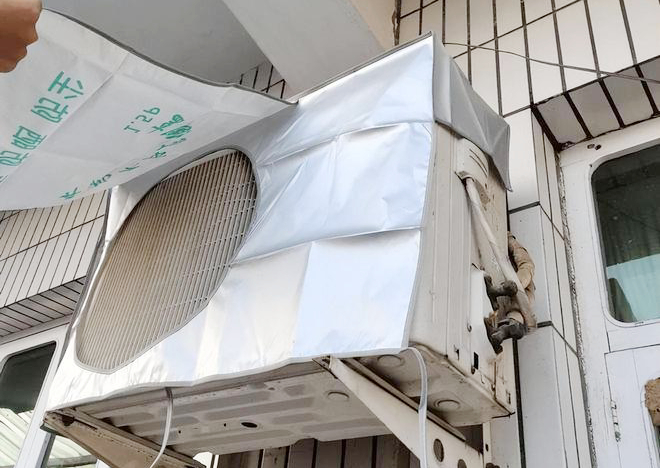An air conditioner consists of two main components: the indoor evaporator unit and the outdoor condenser unit. Because the condenser unit is exposed to the elements year-round, some homeowners worry about its durability and lifespan. Some even believe that direct sunlight exposure increases energy consumption, leading them to cover the unit.
However, air conditioning technicians advise against covering the condenser unit. Doing so is unnecessary and can negatively impact its performance and lifespan.
The condenser unit is already protected.
Manufacturers design condenser units to withstand harsh outdoor conditions. The casing is typically made of corrosion-resistant cold-rolled steel and coated with waterproof, sun-resistant, and anti-rust paint.
Therefore, rain and sunlight have minimal impact on the unit's durability.
 |
Covering the air conditioner's condenser is a well-intentioned but misguided practice. Photo: Aboluowang |
Covering the air conditioner's condenser is a well-intentioned but misguided practice. Photo: Aboluowang
Covering hinders heat dissipation.
The condenser unit generates heat continuously during operation. A cover traps this heat, forcing the unit to work longer and consume more energy. Over time, overheating can damage internal components like the compressor, reducing efficiency and shortening the lifespan of the equipment.
Additionally, covering the unit prevents natural cleaning by rainwater, allowing dust and dirt to accumulate on the condenser coils. This build-up hinders heat exchange and airflow, resulting in reduced cooling and heating efficiency and increasing the risk of damage.
Covering creates safety hazards.
Some people construct covers using lightweight materials like plastic, waterproof fabric, or thin metal sheets. These structures, if not securely fastened, can deteriorate over time and fall, posing a danger to people and property below.
Instead of covering the unit, focus on proper maintenance to extend its lifespan. Regularly inspect the mounting bracket. Metal brackets can rust, loosen, or break after years of use. Experts recommend checking them at least annually, especially in high-rise buildings. The average lifespan of a bracket is about 5-6 years, and it should be replaced promptly if any issues are detected.
If you live in a dusty or dry area, gently rinse the condenser coils with clean water monthly. Remember to disconnect the power before cleaning to prevent water from damaging the circuit board.
Bao Nhien (From Aboluowang)












